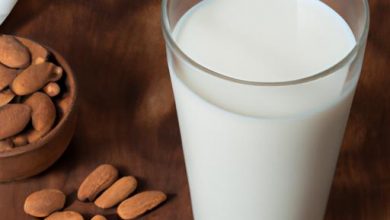How Much Nutrition Is in a Potato?
Potatoes are a staple food in many households worldwide and are prized for their versatility, taste, and nutritional value. They are a good source of vitamins, minerals, and other essential nutrients that the body needs to function properly. In this article, we will explore the nutritional content of potatoes, their macronutrient profile, health benefits, and ways to prepare them for optimal nutrition.
Nutritional Content of Potatoes

Potatoes are an excellent source of vitamins and minerals that are essential for maintaining good health. One medium-sized potato (5.3 ounces) contains:
- Potassium: 620 mg
- Vitamin C: 27 mg
- Vitamin B6: 0.4 mg
- Iron: 1.8 mg
- Magnesium: 32 mg
- Phosphorus: 57 mg
- Niacin: 2.1 mg
- Folate: 20 mcg
Potatoes are also a good source of dietary fiber, with one medium-sized potato containing 2 grams of fiber. They are also low in calories, with one medium-sized potato containing only 110 calories.
Despite their high carbohydrate content, potatoes have a low glycemic index, which means that they do not cause a rapid increase in blood sugar levels. This makes them an excellent food choice for people with diabetes or those who want to manage their blood sugar levels.
Research has shown that the nutritional content of potatoes can vary depending on the variety, growing conditions, and cooking method used. For example, boiled potatoes retain more of their nutrients than baked or fried potatoes.
Macronutrient Profile of Potatoes
In addition to their vitamins and minerals, potatoes are also a good source of macronutrients, including carbohydrates, protein, and fat. One medium-sized potato contains:
- Carbohydrates: 26 grams
- Protein: 2 grams
- Fat: 0 grams
The carbohydrates in potatoes are mainly in the form of starch, which is a complex carbohydrate that is broken down slowly by the body. This means that potatoes provide a sustained source of energy and help to keep you feeling full for longer.
Potatoes are also a good source of plant-based protein, with one medium-sized potato containing 2 grams of protein. While this may not seem like a lot, it can contribute to your daily protein intake.
Overall, the macronutrient profile of potatoes makes them an excellent food choice for people who want to maintain a healthy weight and manage their blood sugar levels.
Macronutrient Profile of Potatoes
Compared to other popular food sources, potatoes have a relatively low amount of fat and protein. However, they are an excellent source of carbohydrates, which make up the majority of their macronutrient profile.
Research has shown that potatoes have a lower glycemic index than many other starchy foods, such as white bread or rice. This means that they are less likely to cause a rapid increase in blood sugar levels, which can lead to insulin resistance and type 2 diabetes.
Potatoes are also a good source of resistant starch, which is a type of carbohydrate that is not digested in the small intestine. Instead, it passes through to the large intestine, where it acts as food for the beneficial bacteria that live there. This can have a positive effect on gut health and may help to reduce the risk of colon cancer.
While potatoes are a good source of carbohydrates, it is important to note that they should be consumed in moderation as part of a balanced diet. Eating too many carbohydrates can lead to weight gain and an increased risk of chronic diseases, such as heart disease and type 2 diabetes.
Health Benefits of Potatoes
Potatoes have numerous health benefits that make them an excellent addition to a healthy, balanced diet. Some of the most notable benefits include:
Weight Management
Potatoes are low in calories and high in fiber, which can help to keep you feeling full for longer. This can be beneficial for weight management as it can help to reduce overall calorie intake.
Digestive Health
The resistant starch in potatoes can act as food for the beneficial bacteria in the gut, which can help to improve digestive health and reduce the risk of colon cancer.
Heart Health
Potatoes are a good source of potassium, which is a mineral that is essential for maintaining healthy blood pressure levels. Eating a diet rich in potassium can help to reduce the risk of heart disease and stroke.
Prevention of Chronic Diseases
The antioxidants in potatoes, such as vitamin C and beta-carotene, can help to protect cells from damage caused by free radicals. This can help to reduce the risk of chronic diseases, such as cancer and heart disease.
Overall, potatoes are a nutritious and versatile food that can provide numerous health benefits when consumed as part of a balanced diet.
Ways to Prepare Potatoes for Optimal Nutrition
Potatoes can be prepared in a variety of ways, but some methods are better than others when it comes to preserving their nutritional content. Here are some tips for preparing potatoes for optimal nutrition:
- Boil or steam potatoes instead of frying or baking them. Boiling and steaming potatoes are the best ways to retain their nutrients. If you must bake or fry them, try to use minimal oil and avoid charring or overcooking them.
- Store potatoes in a cool, dark place. Sunlight and heat can cause potatoes to lose their nutrients. Store them in a cool, dark place, such as a pantry or cellar, to preserve their nutritional content.
- Eat the skin. Most of the vitamins and minerals in potatoes are found in the skin. If you peel the potatoes, you’ll be missing out on some of their nutritional value.
- Combine potatoes with other nutrient-rich foods. Potatoes can be a great addition to a healthy diet when combined with other nutrient-rich foods, such as vegetables, lean protein, and healthy fats.
Conclusion
In conclusion, potatoes are a nutritious and versatile food that can provide many health benefits. They are a good source of vitamins, minerals, and other essential nutrients that the body needs to function properly. Potatoes also have a low glycemic index and can help to manage blood sugar levels.
To get the most nutritional content out of potatoes, it’s important to prepare them in the right way and store them properly. Boiling or steaming potatoes and eating the skin are great ways to retain their nutrients. Combining potatoes with other nutrient-rich foods can also help to maximize their health benefits.
At Zahnweiss Info, we believe in the importance of maintaining good dental health as part of an overall healthy lifestyle. Including nutrient-rich foods like potatoes in your diet can help to support good dental and overall health.




